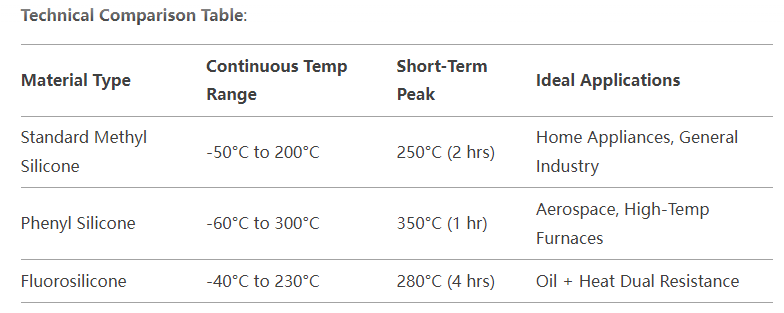A Technical Guide for Selecting Reliable Seals in Extreme Heat (-50°C to 300°C)
High-temperature silicone seals are vital for industrial safety and equipment longevity. For instance, a leading automotive manufacturer faced recurring engine oil leaks due to seal degradation under extreme heat, resulting in over $1 million in annual maintenance costs. At SYDNIX Electronics, we specialize in high-performance sealing solutions. This guide unpacks five critical performance indicators for selecting silicone seals that withstand harsh thermal environments, helping you avoid costly downtime and safety risks.
1. Temperature Range: Static vs. Dynamic Applications
- Static Applications (e.g., oven doors):
- Continuous Operating Range: Standard silicone: -50°C to 200°C; phenyl silicone variants: up to 300°C.
- Case Study: A global industrial oven manufacturer extended seal lifespan by 3x using SYDNIX phenyl silicone seals.
- Dynamic Applications (e.g., engine components):
- Frictional heat reduces effective temperature tolerance by 20–30°C below nominal ratings.
- Recommendation: Opt for high tear-strength silicone (≥25 kN/m) to resist mechanical stress.
- Technical Comparison Table:

2. Compression Set: Ensuring Long-Term Seal Integrity
- Testing Standard (ASTM D395):
- Seals compressed by 25% at elevated temperatures for 22 hours; ≤20% deformation post-recovery is industry-accepted.
- SYDNIX Performance: ≤15% deformation at 150°C.
- Process Innovation:
- Two-Stage Vulcanization: Reduces volatile residues, enhancing elasticity.
- Client Feedback: A chemical plant extended seal replacement intervals from 6 months to 2 years using SYDNIX’s optimized seals.
3. Thermal Aging Resistance: Predicting Service Life
- Aging Test Protocol (GB/T 3512):
- Accelerated aging (e.g., 200°C × 72 hours) measures tensile strength retention.
- Premium silicones retain ≥80% tensile strength post-testing.
- Material Enhancements:
- Heat Stabilizers: Additives like iron oxide red mitigate free radical damage.
- Custom Testing: SYDNIX offers client-specific aging simulations (temperature/duration) with detailed reports.
4. Chemical Compatibility: Surviving Harsh Media
- Common Failures:
- Heat accelerates reactions with oils, acids, or alkalis, causing swelling or cracking.
- Selection Strategy:
- Oil Resistance: Fluorosilicone for engine oil or hydraulic fluid exposure.
- Acid/Alkali Resistance: High-purity silicone + PTFE coatings (e.g., food processing equipment).
Case Study:
A food processing client using standard seals experienced 12% volume swelling in 150°C steam with mild acid cleaners. Switching to SYDNIX acid-resistant seals reduced swelling to <3%, eliminating unplanned downtime.
5. Installation & Groove Design: Preventing Mechanical Failure
- Optimal Compression Ratios:
- Static Seals: 15–25%
- Dynamic Seals: 10–15% (excessive compression increases friction/heat).
- Groove Design Guidelines:
- Width = Seal Cross-Section × 1.3
- Depth = Seal Cross-Section × 0.8
- Free Engineering Support: SYDNIX provides groove design optimization within 48 hours of CAD submission.